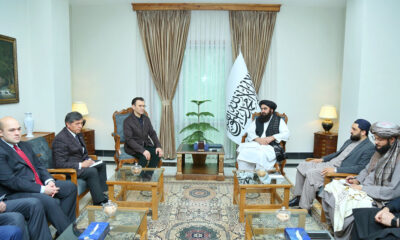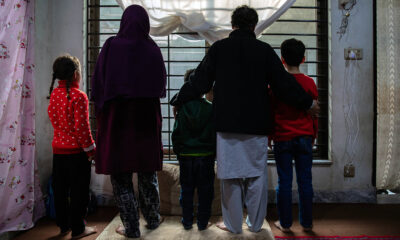Latest News
Afghanistan now ranks 2nd on crisis committee’s Emergency Watchlist

Afghanistan has risen to second on the UK’s International Rescue Committee’s annual Emergency Watchlist due to a triple threat of conflict, COVID-19 and climate change.
In its latest report, issued on Tuesday, IRC said the number of people in need for 2021 nearly doubled compared to early 2020, and Afghanistan rose from sixth to second on the IRC’s Emergency Watchlist.
According to the IRC, as peace talks between the Afghan government and the Taliban fail to make progress, Afghans remain under continued threat of violence, with many fleeing their homes in search of safety. Amid this volatility, women and girls are also at greater risk of experiencing violence within their own homes.
“When Afghans cannot provide for their family, we see a surge in violence against the most vulnerable family members,” says Vicki Aken, country director for the IRC in Afghanistan.
“This forces many families, including children, to risk their lives in desperate attempts to leave Afghanistan and seek safer, better lives elsewhere. A peaceful resolution to the ongoing conflict is the only sustainable solution to meeting chronic need in Afghanistan.”
The IRC stated that among the reasons Afghanistan is one of the countries most at risk of humanitarian catastrophe in 2021 is because of political uncertainty which “is likely to drive conflict between the Taliban and Afghan government forces”.
The organization stated that fighting in late 2020 alone forced 35,000 people from their homes and could indicate a larger escalation in conflict yet to come.
The report also found that ongoing conflict makes it difficult for many Afghans to access health care.
In line with this, ongoing conflict also forced 38 health facilities to close in 2020, making it difficult for many Afghans to receive lifesaving care during the COVID-19 pandemic, and preventing aid workers from meeting increased humanitarian needs.
COVID-19 has also pushed Afghans into poverty, making food insecurity likely to continue to grow in 2021, the IRC reported adding that as the pandemic continues, an additional six million Afghans are at risk of poverty and 42 percent are expected to face crisis levels of food insecurity.
The IRC also stated that reports of early marriages and violence against women have increased in the wake of ongoing conflict and women continue to be targeted by armed groups.
In addition to this, increasing natural disasters are uprooting families and driving greater humanitarian needs.
The organization reported that natural disasters and extreme weather conditions continue to plague Afghanistan, partly due to climate change. “In fact, the country is ranked one of the top 10 most vulnerable to climate change across the globe,” the report stated.
Over one million people remain displaced due to natural disasters and around half of the districts in Afghanistan experienced a natural disaster in 2020, affecting over 110,000 people, read the report.
“Impending drought this year threatens much of the country, posing further displacement and widespread hunger. Already, 42 percent of the population is experiencing food insecurity, and this will increase as the drought takes hold,” read the report.
The International Rescue Committee has been working in Afghanistan since 1988, reaching over one million people each year with emergency aid and recovery programmes.
The annual Emergency Watchlist is a global list of humanitarian crises the IRC expects to significantly deteriorate over the course of the coming year.
Latest News
Doha process private sector meeting highlights growth and coordination in Afghanistan
The session was divided into two segments, focusing on growth and inclusion in the first part, and coordination and transparency in the second.
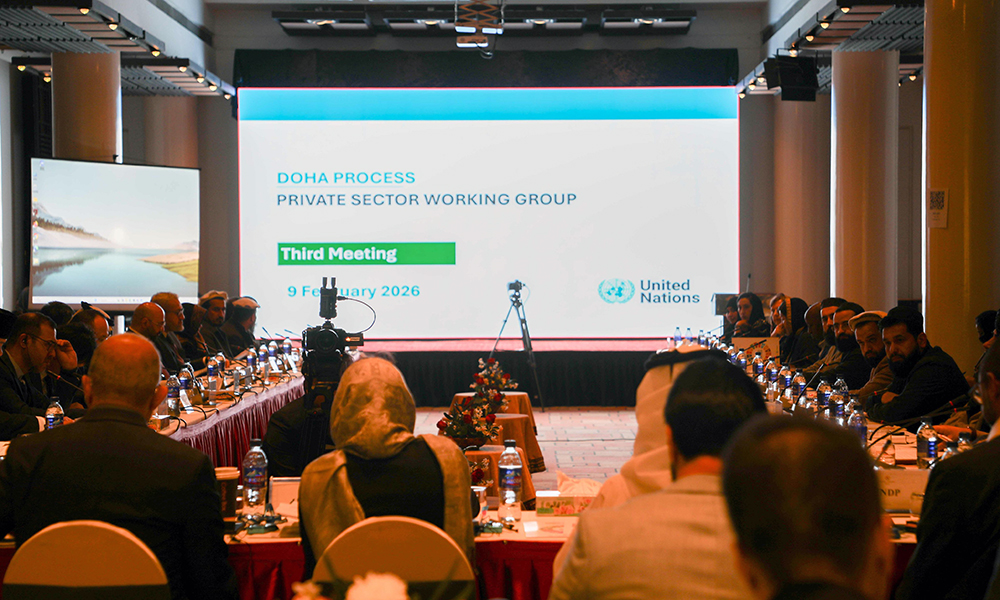
The 3rd session of the Doha Process Private Sector Working Group was held both in-person and online at Kabul’s Grand Hotel, hosted by the United Nations Assistance Mission in Afghanistan (UNAMA).
The meeting brought together representatives from the Islamic Emirate of Afghanistan, including the Ministries of Foreign Affairs, Finance, Industry and Commerce, Economy, Labor and Social Affairs, and the Central Bank, alongside UNAMA, UN agencies, international and regional organizations, as well as ambassadors, diplomats, and private sector experts.
The session was divided into two segments, focusing on growth and inclusion in the first part, and coordination and transparency in the second.
Afghanistan’s Islamic Emirate representatives shared achievements and progress since assuming governance, while participants acknowledged these efforts and highlighted their ongoing support for the private sector. All parties offered recommendations to address challenges and emphasized enhanced cooperation moving forward.
International Sports
IPL 2026: Franchise sales gather pace as global investors circle teams
Royal Challengers Bengaluru (RCB) has been put on the market by its current owner and is estimated to be worth up to $2 billion.

Developments off the field are drawing growing attention ahead of the 2026 Indian Premier League season, with two franchises — Royal Challengers Bengaluru and Rajasthan Royals — formally up for sale and attracting interest from high-profile domestic and international investors.
Royal Challengers Bengaluru (RCB), one of the league’s most recognisable teams, has been put on the market by its current owner, Diageo’s United Spirits Ltd, following a strategic review. The sale process is expected to be completed by the end of March 2026. Market estimates suggest the franchise could be valued at around $2 billion, reflecting the soaring commercial value of the IPL.
Several bidders have been shortlisted for RCB, including investment groups led by Indian industrialists, private equity firms and overseas sports owners. Among those reported to have shown interest is a consortium linked to the Glazer family, co-owners of English Premier League club Manchester United. Non-binding bids have already been submitted, with binding offers expected in the coming weeks.
Rajasthan Royals (RR), winners of the inaugural IPL title in 2008, are also in the process of being sold. A shortlist of potential buyers has been finalised, featuring a mix of Indian and international investors, including private equity firms, entrepreneurs and media-linked groups. The franchise is expected to attract a valuation of more than $1 billion, according to market estimates.
Final bids for Rajasthan Royals are anticipated in early March, while the RCB transaction is expected to move into its final phase later this month. Any change in ownership will require approval from the Board of Control for Cricket in India (BCCI).
The potential sales mark one of the most significant ownership shake-ups in IPL history and underline the league’s growing appeal as a global sports investment as preparations continue for the 2026 season.
Latest News
FM Muttaqi meets Uzbek Central Asia Institute Chief, stresses stronger bilateral cooperation
During the meeting, the two sides discussed ways to further strengthen political and economic cooperation, as well as key regional issues.
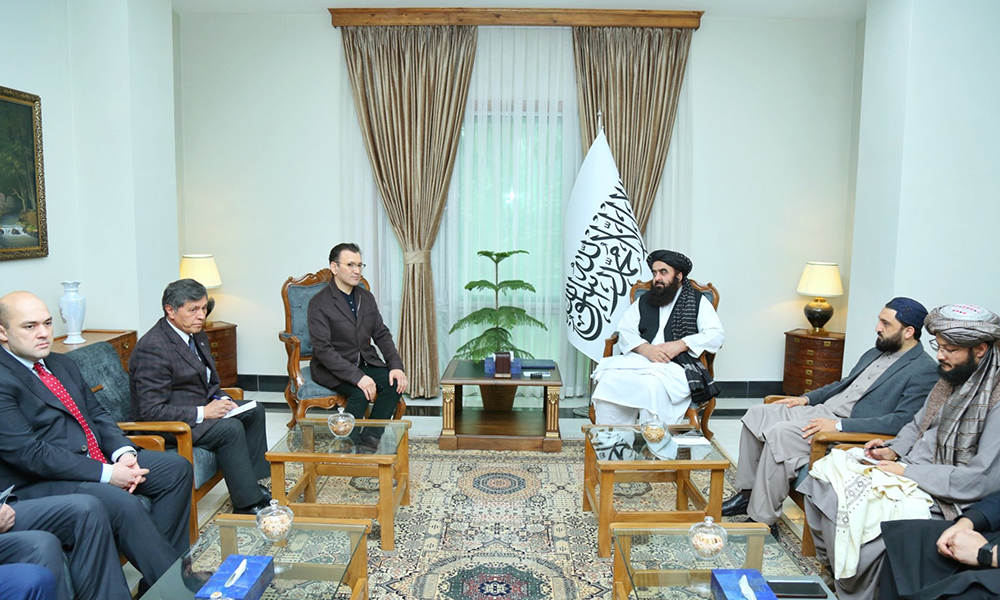
Afghanistan’s Minister of Foreign Affairs, Amir Khan Muttaqi, has met with a delegation led by Joulan Vakhabov, head of Uzbekistan’s International Institute of Central Asia and adviser to the country’s deputy president.
During the meeting, the two sides discussed ways to further strengthen political and economic cooperation, as well as key regional issues.
Muttaqi said Uzbekistan has adopted a positive and goodwill-based policy toward Afghanistan, expressing hope that bilateral relations and cooperation would continue to expand.
He also underscored the important role of research institutions in promoting mutual understanding, enhancing cooperation, and developing a realistic assessment of regional dynamics.
For his part, Vakhabov praised the progress and stability in Afghanistan and voiced optimism that trade between the two countries would increase further in the current year.
-

 Latest News3 days ago
Latest News3 days agoAfghanistan to grant one- to ten-year residency to foreign investors
-

 Sport4 days ago
Sport4 days agoIndonesia shock Japan to reach historic AFC Futsal Asian Cup final
-

 Sport5 days ago
Sport5 days agoMilano Cortina 2026 Winter Olympics: What You Need to Know
-

 Sport3 days ago
Sport3 days agoIran clinch AFC Futsal Asian Cup 2026 in penalty shootout thriller
-

 Latest News3 days ago
Latest News3 days agoAfghanistan says Pakistan is shifting blame for its own security failures
-
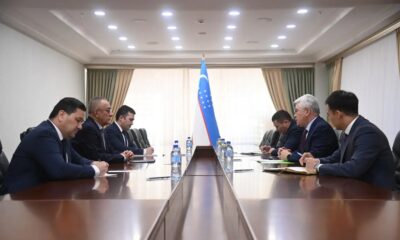
 Latest News5 days ago
Latest News5 days agoUzbekistan, Kazakhstan discuss cooperation on Afghanistan
-

 International Sports2 days ago
International Sports2 days agoWinter Olympics gain momentum as medal table takes shape
-

 Latest News5 days ago
Latest News5 days agoAfghanistan facing deepening hunger crisis after US Aid Cuts: NYT reports










